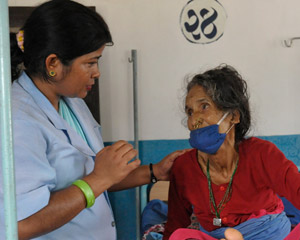
Professor Alimuddin Zumla is renowned internationally for his leadership in TB and TB/HIV research and for establishing north-south partnerships for TB research. Dr Zumla's collaborations now span five countries in Europe and 10 in sub-Saharan Africa, where he leads several multi-country research projects. His team's research findings have contributed to the development of WHO's management guidelines on treatment and prevention of TB and TB/HIV and have led to improvements in the care of patients worldwide.
Dr Zumla is Professor of Infectious Diseases and International Health, University College London Medical School, and Consultant Infectious Diseases Physician at University College London Hospitals NHS Trust, London. He also serves as visiting professor at several European and African universities and is Chairman of the International Scientific Advisory Committee to the United Kingdom All Party Parliamentary Group on Global Tuberculosis.
A founding member and trustee of the UK charity TB Alert, Dr Zumla pioneered the London TB Link Project, which brought to light the growing problem of TB in London. He has authored 368 publications and edited 17 medical textbooks, including the classic Tuberculosis: A Comprehensive Clinical Reference. He is the recipient of several prestigious awards including the Weber Parkes Trust Medal (2000), The Albert Chalmers Medal (2004), The India International Foundation Science Award (2011) and The Spinoza Leerstoel Award of the University of Amsterdam (2011).
Professor Zumla, a native of Zambia, qualified in medicine in 1979 at the University of Zambia School of Medicine and subsequently completed specialty training in infectious diseases, tropical medicine and clinical immunology in the UK and United States.
Please click on below links for more information about Professor Zumla
International Nepal Fellowship (INF) Nepal

The International Nepal Fellowship (INF), has been working on TB in Nepal since 1973 and in 1985 became the regional counterpart to the National Tuberculosis Programme, taking charge of implementing TB control activities in all 15 districts of Nepal's mid-western region.
In addition to providing basic TB services, INF trains staff from health facilities, government programmes and partner NGOs on how to improve the quality of TB care. Recognizing that TB is a disease mainly affecting poor and vulnerable groups, the organization operates a fund that provides medicine, tests and help with transport costs to needy patients. INF operates the only centre in the region providing outpatient and inpatient services for people with multidrug-resistant TB (MDR-TB), operating a hostel that provides food and shelter for patients.
INF has a staff of about 340 Nepalis and 20 expatriate volunteers. The organization also works on leprosy control, community health and development, hospital and rehabilitation services for people with disabilities, drug awareness/rehabilitation and HIV education, counselling and care.

